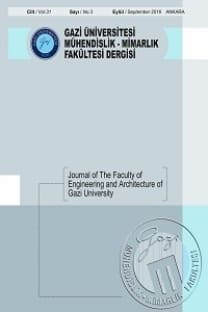Teknoloji yol haritalarını arttırmak için tip-2 bulanık sistemler temelli yeni bir yaklaşım
Teknoloji yol haritası oluşturma, ilişki analizi, Bulanık sistemler, 3D yazıcı teknolojileri
A novel approach based on type-2 fuzzy sets to augment technology roadmaps
___
- 1. Willyard C.H., McClees C.W., Motorola’s technology roadmap process, Research Management, 30 (5), 13–19, 1987.
- 2. Garcia M.L., Bray O.H., Fundamentals of technology roadmapping, Albuquerque: Sandia National Laboratories, New Mexico, 1997.
- 3. Bloem S.L., Vasconcellos E., Guedes L.V., Guedes L.F.A., Costa R.M., Technology roadmapping: A methodologic proposition to refine Delphi results, Technological Forecasting and Social Change 126, 194-206, 2018.
- 4. Daim T.U., Yoon B.S., Lindenberg J., Grizzi R., Estep J., Oliver T., Strategic roadmapping of robotics technologies for the power industry: A multicriteria technology assessment, Technological Forecasting and Social Change 131, 49-66, 2018.
- 5. Amer M., Daim T.U., Jetter A., Technology roadmap through fuzzy cognitive map based scenarios: The case of wind energy sector of a developing country, Technology Analysis & Strategic Management 28 (2), 131-155, 2016.
- 6. Winkowski C., Technology development roadmaps: A bibliometrics analysis of scientific literature, European Research Studies Journal 23 (2), 2020.
- 7. EIRMA, Technology roadmapping – delivering business vision, Working group report, European Industrial Research Management Association, Paris, No. 52, 1997.
- 8. Phaal R., Farrukh C.J., Probert, D.R., Technology roadmapping – A planning framework for evolution and revolution, Technological Forecasting and Social Change 71 (1-2), 5-26, 2004.
- 9. Valerio K.G.O., Silva C.E.S., Neves S.M., Overview on the technology roadmapping (TRM) literature: Gaps and perspectives, Technological Analysis & Strategic Management, 2020. https://doi.org/10.1080/09537325.2020.1787976
- 10. Geum Y., Lee S., Park Y., Combining technology roadmap and system dynamics simulation to support scenario-planning: A case of car-sharing service, Computers & Industrial Engineering 71, 37–49, 2014.
- 11. Yoon B., Phaal R., Structuring technological information for technology roadmapping: Data mining approach, Technology Analysis & Strategic Management 25, 1119–1137, 2013.
- 12. Strauss J.D., Radnor M., Roadmapping for dynamic and uncertain environments, Research-Technology Management, 47 (2), 51–58, 2004.
- 13. Fenwick D., Daim T.U., Gerdsri N., Value driven technology roadmapping (VTRM) process integrating decision making and marketing tools: Case of internet security technologies, Technological Forecasting and Social Change 76 (8), 1055–1077, 2009.
- 14. Caetano M., Amaral D.C., Roadmapping for technology push and partnership: A contribution for open innovation environments, Technovation 31 (7), 320–335, 2011.
- 15. Vishnevskiy K., Karasev O., Meissner D., Integrated roadmaps and corporate foresight as tools of innovation management: The case of Russian companies, Technological Forecasting and Social Change 90, 433–443, 2015.
- 16. Toro-Jarrin M.A., Ponce-Jaramillo I., Guemes-Castorena D., Methodology for the of building process integration of business model canvas and technological roadmap, Technological Forecasting and Social Change 110, 213–225, 2016.
- 17. Son H., Kwon Y., Park S., Lee S., Using a design structure matrix to support technology roadmapping for product–service systems, Technology Analysis & Strategic Management 30 (3), 337-350, 2018.
- 18. Warfield J.N., Binary matrices in system modeling, IEEE Transactions on systems, man and cybernetics SMC 3 (5), 441–449, 1973.
- 19. Son W., Lee S., Integrating fuzzy-set theory into technology roadmap development to support decision-making, Technology Analysis & Strategic Management 31(4), 447-461, 2019.
- 20. Dereli T., Altun K., Technology evaluation through the use of interval type-2 fuzzy sets and systems, Computers & Industrial Engineering, 65 (4), 624-633, 2013.
- 21. Hagras H., A hierarchical type-2 fuzzy logic control architecture for autonomous mobile robots, IEEE Trans. on Fuzzy Systems 12, 524–539, 2004.
- 22. Hagras H., Type-2 FLCs: A new generation of fuzzy controllers, IEEE Computational Intelligence Magazine 2 (1), 30–43, 2007.
- 23. Mendel J.M., Uncertain rule-based fuzzy logic systems: Introduction and new directions, Upper Saddle River, NJ, Prentice-Hall, 2001.
- 24. Wu D., Tan W.W., Genetic learning and performance evaluation of type-2 fuzzy logic controllers, Engineering Applications of Artificial Intelligence 19 (8), 829–841, 2006.
- 25. Dereli T., Baykasoğlu A., Altun K., Durmuşoğlu A., Türkşen İ.B., Industrial applications of type-2 fuzzy sets and systems: A concise review, Computers in Industry 62 (2), 125–137, 2011.
- 26. Mendel J.M., Wu D., Perceptual computing: Aiding people in making subjective judgements, IEEE Press Series on Computational Intelligence, 2010.
- 27. Huang C.Y., Lin Y.C., Yang C.L., Sun Y., Cheng J.C., Kuo Y.T., Wang L.C., Wang S.Y., Hsu H.E., Hsu H.H., A fuzzy MOP based competence set expansion method for technology roadmap definitions, Knowledge Innovation Through Intelligent Software Methodologies, Tools and Techniques (Ed. Fujita H.), IOS Press, 2020.
- 28. Son C., Kim J., Kim Y., Developing scenario-based technology roadmap in the big data era: A utilization of fuzzy cognitive map and text mining techniques, Technology Analysis & Strategic Management 32 (3), 272-291, 2020.
- 29. Lai C., Xu L., Shang J., Optimal planning of technology roadmap under uncertainty, Journal of the Operational Research Society 71 (4), 673-686, 2020.
- ISSN: 1300-1884
- Yayın Aralığı: Yılda 4 Sayı
- Başlangıç: 1986
- Yayıncı: Oğuzhan YILMAZ
Eş zamanlı çok işlem parçacıklı işlemcilerde adalet için güvenli önbellek paylaşımı
Zaman serileri analizi için optimize ARIMA-YSA melez modeli
Fahriye Merdivenci, Mahmut Burak Erturan
Geri kazanılmış agregalı betonun betonarme binaların deprem performansına etkisinin incelenmesi
Zeynep FIRAT ALEMDAR, Yavuz KURT
Ahmet Reşit Kavsaoğlu, Kerim Özkara
Tek ve üç fazlı demir çekirdekli şönt reaktörlerin optimum tasarımı
Hakan AYDIN, İmren OZTURK YILMAZ, Abdullah BİLİCİ
Sezgisel bulanık çok uzmanlı & çok ölçütlü karar verme metodolojisi: sağlık sektöründe bir uygulama
DDL: Çoklu kapı numarası tespit etme ve kümeleme için derin öğrenme tabanlı yeni bir yaklaşım
Faz diyagramında plazmanın konumu
Beycan İBRAHİMOĞLU, Zeki YİLMAZOGLU, Fuat KARAKAYA, Beycan İBRAHİMOĞLU
